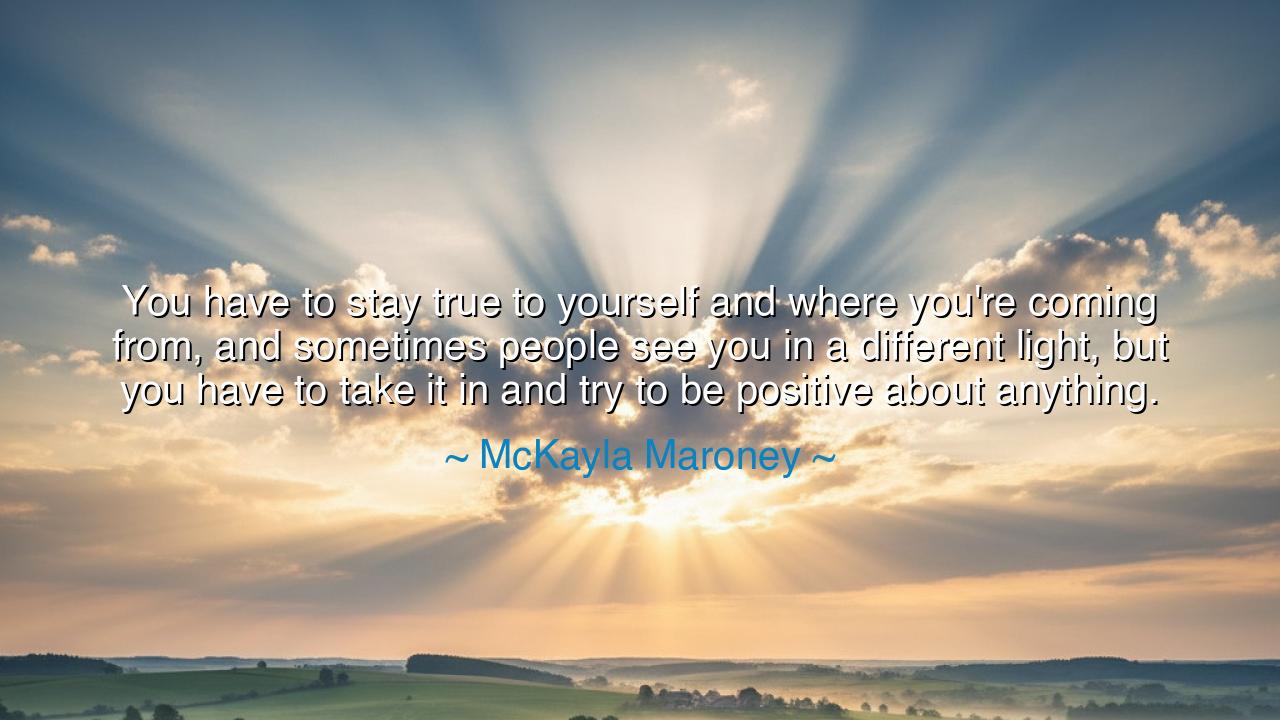
You have to stay true to yourself and where you're coming from
You have to stay true to yourself and where you're coming from, and sometimes people see you in a different light, but you have to take it in and try to be positive about anything.






When McKayla Maroney declared, “You have to stay true to yourself and where you’re coming from, and sometimes people see you in a different light, but you have to take it in and try to be positive about anything,” she spoke as one who has known both triumph and scrutiny, both glory and the burden of others’ expectations. Her words are a call to authenticity, a reminder that the soul must not be shaped entirely by the judgments of others. To be true to yourself is to hold firm to your essence, even when the world misinterprets or distorts it.
The ancients recognized this principle well. The Oracle at Delphi inscribed upon her temple the command: “Know thyself.” To know oneself was to carry an unshakable foundation amid the storms of reputation, fortune, or slander. Maroney echoes this wisdom: though others may cast you “in a different light,” your task is not to chase their shadows but to stand steadfast in your own truth. The light of self-understanding is brighter than the fickle glimmer of public opinion.
History provides a shining example in Socrates, the philosopher of Athens. Misunderstood by many, accused of corrupting the youth, and sentenced to death, he could have yielded to fear or altered his course to please the crowd. Yet he remained loyal to his inner voice, declaring that an unexamined life was not worth living. Though condemned by others, he carried within himself the peace of authenticity. His story is proof that to stay true to yourself, even at great cost, is nobler than to live by the shifting lights of others’ approval.
Maroney’s words also teach us the art of resilience. When she says we must “be positive about anything,” she is not inviting us to ignore hardship, but to transform it. To be misjudged or misunderstood is painful, but it can become an opportunity for growth. Criticism, when met with anger, hardens the heart; but when met with positivity, it strengthens resolve and refines character. It is in this alchemy of perspective that suffering becomes a stepping-stone to greatness.
At the heart of her teaching lies a paradox: you cannot control how others perceive you, yet you can control how you respond. If they see you in a “different light,” let it be a reminder that your value does not come from their gaze. The true task is not to manage their perceptions, but to master your own spirit. By responding with positivity, you guard your inner flame from the winds of judgment, ensuring that it burns steadily regardless of what others say.
The lesson is clear: live with authenticity, and meet misunderstanding with grace. Do not abandon your roots, nor deny your journey, even when others fail to recognize its worth. Instead, walk forward with the quiet strength of one who knows their path, and let positivity turn even criticism into fuel. For in the end, it is not the world’s light that defines you, but the light that you carry within yourself.
In practice, this means cultivating daily habits of self-reflection and gratitude. Remember often where you came from, honor your story, and let no one’s misunderstanding diminish it. When others misjudge you, resist bitterness, and instead ask, “What can I learn from this? How can I grow stronger?” Surround yourself with those who affirm your truth, but do not fear those who doubt it — for even their doubts can sharpen your resilience.
Therefore, let us carry McKayla Maroney’s wisdom: stay true to yourself, accept that others may see you differently, and choose positivity in response. In this way, you become unshakable, rooted like the oak, shining like the sun — not because the world sees you clearly, but because you see yourself clearly. And that is the beginning of true strength.






TTThanthihung Than
I find this approach motivating, especially in environments with high scrutiny. But it raises questions about limits—how do you remain positive when repeated misunderstandings or negative portrayals persist? I’d like to explore practical strategies for protecting one’s mental health while staying authentic, and whether cultivating a supportive community helps reinforce staying true to oneself in challenging situations.
XHNguyen Xuan Hung
This statement brings to mind the importance of perspective management. Is it more effective to focus on personal growth and self-definition rather than trying to control how others perceive you? I’m curious about the psychological effects of staying true to oneself and how positivity interacts with confidence, resilience, and social influence in both personal and professional contexts.
QTTran Quoc Tung
I feel inspired by the encouragement to be positive despite external opinions. But it also makes me wonder if excessive positivity could lead to ignoring reality or dismissing legitimate concerns. How can people stay hopeful and authentic without minimizing challenges or pretending everything is fine when it isn’t? I’d like to discuss methods for practicing realistic positivity while preserving one’s identity.
QTQuoc Thang
Reading this makes me reflect on the interplay between personal values and external perception. How can individuals stay aligned with their core identity while still growing and learning from others’ feedback? I’d like to explore how embracing positivity doesn’t mean ignoring valid critique, and how to differentiate between constructive advice and misjudgment.
MHVu Minh Hanh
This quote resonates with me because it highlights resilience in the face of differing opinions. But it raises the question: how can one cultivate a genuinely positive perspective when public perception or peer pressure is negative? I’m curious about the role of self-awareness and emotional regulation in interpreting others’ judgments without letting them undermine confidence or authenticity.